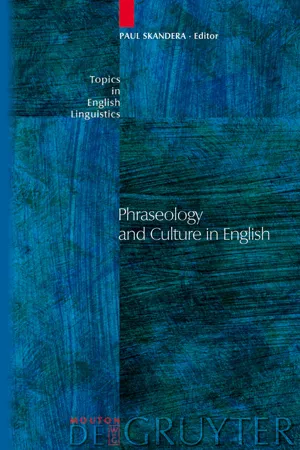
- 520 pages
- English
- PDF
- Available on iOS & Android
Phraseology and Culture in English
About This Book
The proposition that there is a correlation between language and culture or culture-specific ways of thinking can be traced back to the views of Herder and von Humboldt in the late 18th and early 19th centuries. It is generally accepted today that a language, especially its lexicon, influences its speakers' cultural patterns of thought and perception in various ways, for example through a culture-specific segmentation of the extralinguistic reality, the frequency of occurrence of particular lexical items, or the existence of keywords or key word combinations revealing core cultural values.
The aim of this volume is to explore the cultural dimension of a wide range of preconstructed or semi-preconstructed word combinations in English. The 17 papers of the volume are divided into four sections, focusing on particular lexemes (e.g. enjoy and its collocates), types of word combinations (e.g. proverbs and similes), use-related varieties (such as the language of tourism or answering-machine messages), and user-related varieties (such as Aboriginal English or African English). The sections are preceded by a prologue, tracing the development of the study of formulaic language, and followed by an epilogue, which draws together the threads laid out in the various papers.
The relation between language and culture in general has been explored in a number of important works over the past ten years. However, the study of the relation between English phraseology and culture in particular has been largely neglected. This volume is the first book-length publication devoted entirely to this topic.
Frequently asked questions
Information
Table of contents
- Frontmatter
- Contents
- Developments in the study of formulaic language since 1970: A personal view
- Reasonably well: Natural Semantic Metalanguage as a tool for the study of phraseology and its cultural underpinnings
- Australian perceptions of the weekend: Evidence from collocations and elsewhere
- Enjoy!: The (phraseological) culture of having fun
- Hot, heiß, and gorjachij: A case study of collocations in English, German, and Russian
- Collections of proverbs and proverb dictionaries: Some historical observations on what’s in them and what’s not (with a note on current “gendered” proverbs)
- Yankee wisdom: American proverbs and the worldview of New England
- Similes and other evaluative idioms in Australian English
- Definitely maybe: Modality clusters and politeness in spoken discourse
- Lexical developments in greenspeaking
- The phraseology of tourism: A central lexical field and its cultural construction
- Idiomaticity in a cultural and activity type perspective: The conventionalization of routine phrases in answering-machine messages
- Greetings as an act of identity in Tristan da Cunha English: From individual to social significance?
- Multiword units in Aboriginal English: Australian cultural expression in an adopted language
- Fixed expressions as manifestations of cultural conceptualizations: Examples from African varieties of English
- Varieties of English around the world: Collocational and cultural profiles
- Formulaic language in cultural perspective
- Backmatter